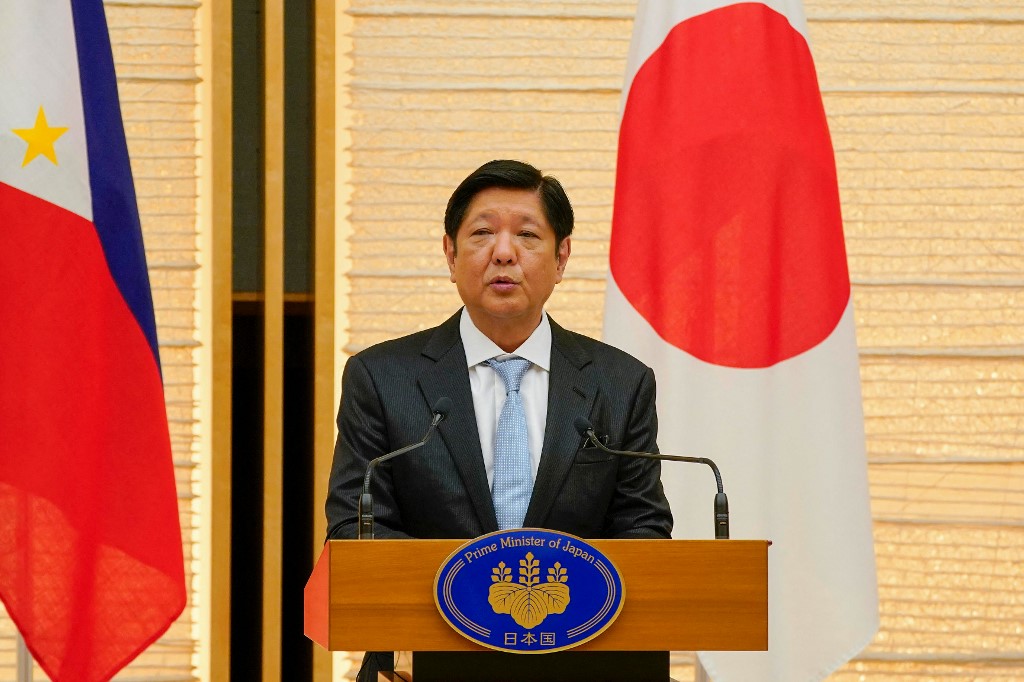
Philippine President Ferdinand Marcos speaks during a press conference with Japanese Prime Minister Fumio Kishida at the prime minister’s official residence in Tokyo on February 9, 2023. (Photo by Kimimasa MAYAMA / POOL / AFP)
TOKYO—President Marcos has secured billions of pesos in investment pledges from Japanese companies as his five-day official visit beginning Wednesday sought to revitalize the Philippines’ partnerships with businesses in the East Asian economic giant.
The commitments followed his meeting with top executives of Japanese semiconductor, electronics and wiring harness companies on Thursday morning at the Okura Hotel here.
In a statement, Malacañang said more than 10,000 jobs would be generated once the investment pledges materialize, calling it an added boost to the government’s bid to secure more jobs for Filipinos.
The total amount of investment commitments will be announced by the President on Friday when the Japanese companies formally sign the letters of intent to invest in the Philippines.
Regional hub
In his remarks before the Japanese executives, Mr. Marcos said he was pushing the Philippines to attract more investments by becoming a regional hub of excellence in the production of printers, wiring harnesses, which are a key component of automobiles and other electronic goods.
During the meeting, government officials and executives of Japanese companies sat down to discuss measures on business expansions and updates on the operations of Japanese companies in the Philippines.
Present were representatives of Japan Aviation Electronics Industry Ltd.; Yazaki Corp.; Yokowo Manufacturing of the Philippines; Sumitomo Electric Industries Ltd.; Brother Industries Ltd.; Ibiden Co. Ltd.; Seiko Epson Corp.; Nidec-Shimpo Corp., and TDK Corp.
Boost to seafarers
Japanese shipping companies also promised to continue hiring Filipino seafarers to man their vessels as they are “essential” to Japan’s maritime industry.
Executives of Japanese shipping companies gave this assurance to the President in a meeting on Thursday, as they thanked him for the Philippine government’s efforts to support initiatives to improve the skills of the country’s seafarers.
“Filipino seafarers are essential to Japanese shipping industry. And so we sincerely and strongly hope that there will continue to be a steady supply of professional and well-trained Filipino seafarers to work alongside us,” said Junichiro Ikeda, president of the Japanese Shipowners’ Association (JSA) and chair of Mitsui OSK Lines.
Filipino seafarers account for about 75 percent of the crew of Japanese ocean-going vessels, while an average of 6,600 Filipino seafarers are deployed annually to vessels with the Japanese Flag of Registry in the past 10 years.
Ikeda added: “We also expect the quality standard of the Filipino seafarers to continue to improve, as the Philippine government continues to work hard to achieve this.”
For his part, the President assured Japanese shipping companies that the government would continue to work closely with them to ensure a ready pool of highly skilled Filipino seafarers required by Japanese companies.
He also expressed his appreciation for the investments of Japanese shipowners in maritime training schools in Canlubang, Laguna, and in Bataan, recording 1,200 cadets per school each year.
Need for dialogue
Meanwhile, Mr. Marcos stressed the importance of organizing roundtable discussions as a “confidence-building measure” aimed at initiating dialogue and addressing issues in an interactive, proactive manner.
“We met with major Japanese companies that have investments in the Philippines and the dialogue has enabled our Japanese partners to air their concerns and for us on the Philippine side to explain what we are doing to resolve their concerns,” said Trade Secretary Alfredo Pascual.
On Wednesday night, the President also had a dinner meeting with executives of Mitsui and Co. led by chief executive Kenichi Hori. Mitsui is involved in product sales, logistics and financing, infrastructure projects, iron and steel, and information technology and communication, among others.

